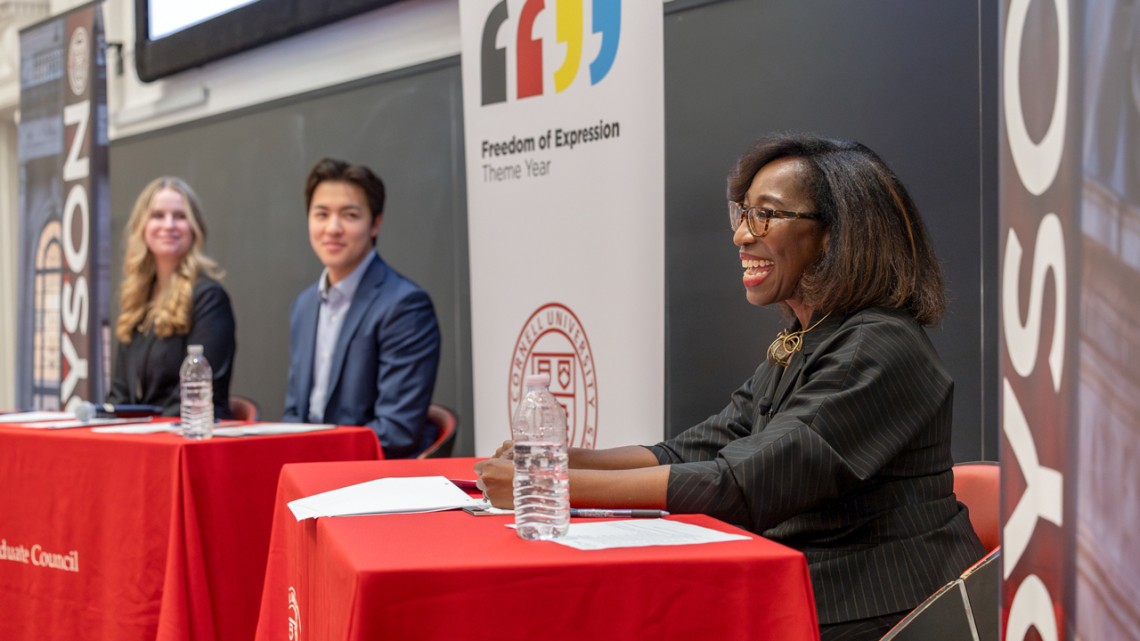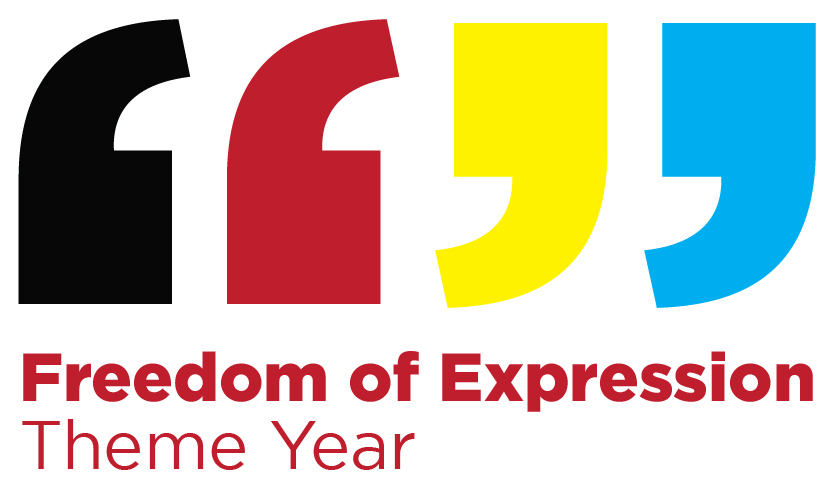
From left, Caroline Brandvold ’26, Brian Kim Koutsis ’25, and Natalie Williams ’86 at the Charles H. Dyson School of Applied Economics and Management Dean’s Distinguished Lecture.
Dyson alum discusses free expression, corporate responsibility
By Janice Endresen
Corporations are caught in a bind when it comes to social issues, Natalie R. Williams ’86 said during the Charles H. Dyson School of Applied Economics and Management Dean’s Distinguished Lecture, March 12 in Warren Hall.
“We face enormous challenges as a country, as a world,” said Williams, managing director and general counsel of card services and strategic transactions and a deputy general counsel for consumer and community banking at JP Morgan Chase. “All across the world, and certainly right here at home, we have enormous political and social division.”
And while corporations are under pressure to take a public stance on high-profile social issues, Williams said, corporate silence is not viewed as neutrality.
“In many quarters, silence is complicity,” she said. “And the stakes for corporations in speaking could not be higher.”
Williams’ lecture, presented in a fireside chat format, was moderated by Dyson School students Caroline Brandvold ’26, president of Dyson Undergraduate Council, and Brian Kim Koutsis ’25, chair of the Dean’s Student Advisory Council. The discussion, held as part of the Dyson School’s Better Business Week, focused on freedom of expression, social impact and corporate responsibilities. The event was one of a series of Freedom of Expression events hosted by the Dyson School at the Cornell SC Johnson College of Business.
An expert on the issues arising from the use of artificial intelligence, machine learning and alternative data, Williams was formerly general counsel of responsible banking, data and privacy at JP Morgan Chase. In the public sector, she served on the Consumer Financial Protection Bureau; as associate White House counsel during the Clinton administration; as a law clerk to Supreme Court Justice Sonia Sotomayor; in the New York State Attorney General’s office; and as chief of the Civil Rights Bureau during Gov. Eliot Spitzer’s administration.
Diverse stakeholders representing myriad points of view expect corporations to align with their values, Williams said, and in this environment, many stakeholders demand that corporations speak out.
“Various stakeholders you’re accountable to – be they your customers, your employees, your shareholders, your suppliers, the communities in which you operate – expect you to represent, reflect and align with their values,” Williams said. “It’s really hard, because all those people have very different views and values. That puts corporations in a difficult spot.”
As a lawyer advising senior leadership for those entities, in partnership with human resources, government relations, risk and communications colleagues, “you are faced, often in very high-pressure situations, with a lot of challenging questions,” she said.
When asked whether it’s a corporation’s responsibility to take a stance on a social or political issue, Williams said she thought it was no longer optional.
“What you say, how you say it, when you say it, to whom you say it – all that matters,” she said. “At the end of the day, every corporation has core values; those should be their North Star. Those should guide you in how you run your business, how you treat your customers, how you work with your suppliers, and how you engage in your communities.”
In welcoming Williams, Jinhua Zhao, the David J. Nolan Dean of the Dyson School, said Williams is engaged with the Dyson School and Cornell in a number of ways, including as a member of the Dyson Advisory Council.
“I’m so happy that we have one of our alums back on campus [to share] deep insights about how businesses are dealing with freedom-of-expression issues and the kinds of challenges they are facing in that area,” Zhao said.
Zhao called attention to her atypical career, encompassing both the private and public sectors, and the perspective she has gained through the breadth and depth of her experiences.
“All my government experiences came to bear in a really nice way to help me in the job that I have now,” Williams said. “And I get to learn and grow every day, and leverage those experiences.
“I would say to anyone and everyone: Try to spend some of your time working in the public sector,” she said. “There is nothing that will make you feel more proud.”
Janice Endresen is an editor for the Cornell SC Johnson College of Business.
Media Contact
Adam Allington
Get Cornell news delivered right to your inbox.
Subscribe

